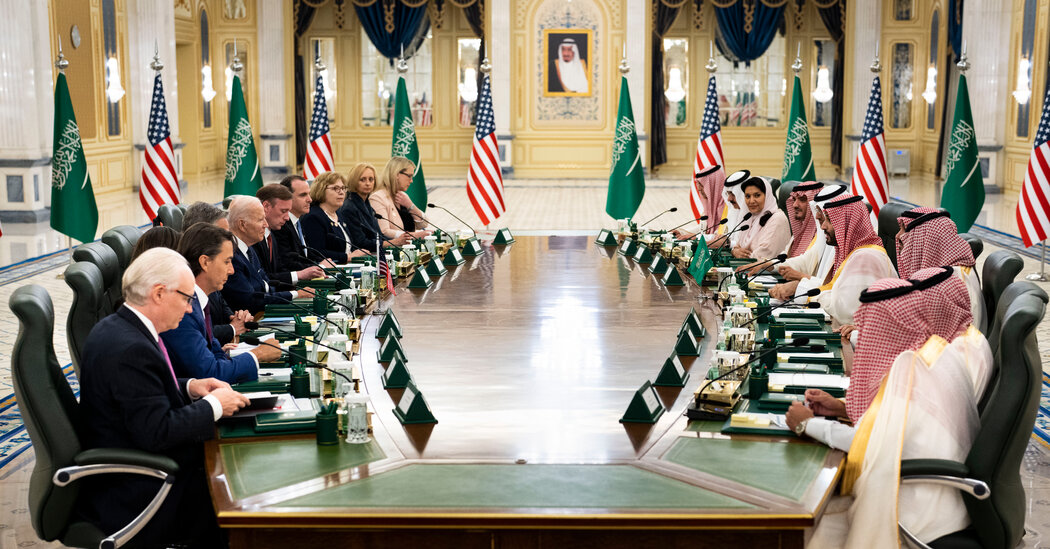
JERUSALEM — President Biden said on Friday that now was not the time to restart peace negotiations between Israel and the Palestinians, but insisted that he remained committed to a two-state solution to their conflict and expressed hope that the diplomatic agreements sealed in 2020 between Israel and four Arab states could give new impetus to the peace process.
“Even if the ground is not ripe at this moment to restart negotiations, the United States and my administration will not give up on trying to bring the Palestinians and Israelis and both sides closer together,” Mr. Biden said.
“In this moment, when Israel is improving relations with his neighbors throughout the region, we can harness that same momentum to reinvigorate the peace process between the Palestinian people and the Israelis,” Mr. Biden added, referring to a set of agreements known as the Abraham Accords, which were negotiated under the Trump administration.
Mr. Biden made the comments at a news conference after meeting with the president of the Palestinian Authority, Mahmoud Abbas, at a gloomy time for Palestinians. The meeting took place in Bethlehem instead of Ramallah, the authority’s administrative hub, to enable Mr. Biden to briefly visit the Church of the Nativity, the fourth-century basilica that stands on a site where tradition holds that Jesus was born.
His remarks followed a call by Mr. Abbas for Mr. Biden to help “prepare the atmosphere for a political horizon for a just, comprehensive, durable peace.”
“Isn’t it time for this occupation to end?” Mr. Abbas said at the news conference. “The key to peace and security in our region begins with recognizing the state of Palestine,” he added, despite Saudi Arabia — the most powerful Arab country — beginning incremental steps on Friday to normalize relations with Israel for the first time.
“The opportunity for the two-state solution along the 1967 borders may be only available today,” the Palestinian leader said. “But we don’t know what will happen later.”
After an exuberant reception in Israel, it was a tenser morning for Mr. Biden, who was met with protests by Palestinians in Jerusalem and Bethlehem, hours before a scheduled flight to what could be still more fraught encounters in Saudi Arabia.
In Bethlehem, Mr. Biden said that his commitment to the goal of a two-state solution had not changed, saying, “Two states along 1967 lines with mutually agreed land swaps remains the best way to achieve equal measures of security, prosperity, freedom and democracy for the Palestinians as well as Israelis.”
Mr. Abbas also pushed Mr. Biden to remove the Palestine Liberation Organization from the U.S. terrorism list and reopen the U.S. consulate to the Palestinians in Jerusalem and the P.L.O. mission in Washington, both of which were closed under President Donald J. Trump.
The Palestinian leadership is divided between the Palestinian Authority, which administers parts of the West Bank, and Hamas, the Islamist militant group that wrested control of Gaza from the authority in 2007. Most Palestinians see little hope of reconciliation, recent polling shows.
In Gaza, a blockade enforced by Israel and Egypt is in its 15th year. One in four Palestinians was unemployed in 2021. Seven in 10 say they believe that a Palestinian state is no longer feasible because of the expansion of Israeli settlements in the West Bank, according to a June poll. Nearly 80 percent want the resignation of Mr. Abbas, the authority’s president, who last faced an election in 2005, and the vast majority see both the authority and Hamas as corrupt.
Against this backdrop, many Palestinians are frustrated with the Biden administration, with 65 percent opposing dialogue between their leadership and the United States. While the Biden administration has often called for a two-state solution to the Palestinian conflict — and Mr. Biden repeated that call on Thursday — the perception among analysts is that he has not matched his words with actions.
On the eve of Mr. Biden’s visit, the White House announced several financial measures intended to improve Palestinian life but stopped short of a political process to create a Palestinian state and left several Trump-era measures in place.
In his remarks on Friday, Mr. Biden also called on the Palestinian Authority to do more to clean its own house.
“The Palestinian Authority has important work to do as well, if you don’t mind my saying,” Mr. Biden said. “Now’s the time to strengthen Palestinian institutions to improve governance, transparency and accountability. Now’s the time to unleash the incredible potential of the Palestinian people through greater engagement and civic society to combat corruption, advance rights and freedoms, and improve community services.”




